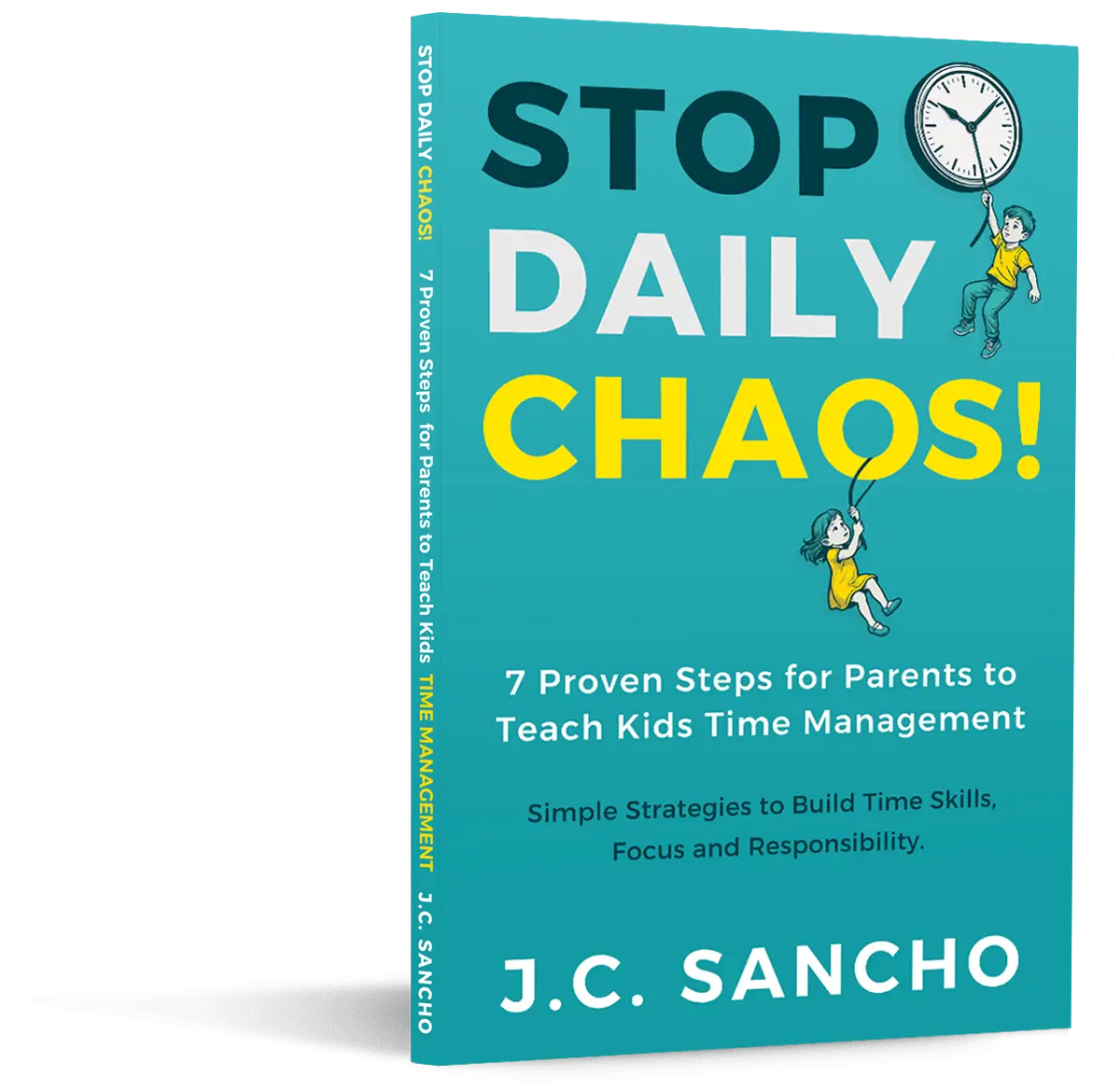Working parent guilt shows up in quiet moments—during the morning rush, while packing lunches, while glancing at the clock from your desk, or when you miss a school event because work ran long. Many parents carry this tension every day. You want to succeed at work, you want to show up for your child, and you want to stop feeling torn in two directions. This guide helps you move from guilt to clarity, from overwhelm to intention, and from scattered attention to meaningful connection.
Why Working Parent Guilt Feels So Heavy
Working parent guilt describes the internal pressure parents feel when balancing their career with raising children. It often appears as the thought, “I’m not doing enough,” even when evidence says otherwise. The emotional load can influence confidence, mental health, and the way you relate to your child at the end of a long day.
Addressing this guilt matters because it shapes the tone of your home. When guilt leads the way, interactions become rushed, distracted, or filled with self-doubt. When clarity replaces guilt, you parent with steadiness rather than pressure. You model confidence, problem-solving, and emotional regulation—skills your child learns by watching you.
The Factors Driving Working Parent Guilt
Several forces contribute to guilt: cultural expectations, comparison to other families, workplace demands, and internal beliefs about what “good parenting” looks like. None of these pressures reflect the reality of modern family life. Raising children while maintaining a career requires flexibility, not rigid standards rooted in an older model of parenting.
Understanding these pressures softens their grip. Guilt loses strength when you recognize it as a reaction to unrealistic expectations rather than evidence of failure.
How to Shift From Guilt to Connection
1. Reframe What “Being Present” Means
Parents often assume that more time equals better parenting. What matters most is presence—your ability to slow down, tune in, and make your child feel seen. Ten minutes of focused attention provides more connection than an hour of half-hearted multitasking.
A simple shift creates relief: you do not need endless hours. You need meaningful moments. This mindset lowers pressure while increasing connection.
2. Build Small Daily Rituals That Anchor Your Child
Rituals create reliability. They help your child feel grounded even when your schedule is busy. These routines do not require elaborate planning. They thrive on consistency.
- Morning connection: a short breakfast chat, a shared joke, or a note in their bag.
- After-school reconnection: five minutes to hear the highlight of their day.
- Evening wind-down: reading together, stretching together, or sharing “one good thing that happened today.”
Rituals reassure your child that your bond remains steady regardless of your work schedule. They also help release guilt because you know you’ve created intentional touchpoints built around closeness.
3. Make Quality Time Your Priority, Not Quantity
The misconception that “more time equals better parenting” creates unnecessary guilt. Research consistently shows that high-quality parent engagement matters far more than the total number of hours spent together. Quality time strengthens emotional security, improves behavior, and supports healthy development—and it fits into the life of a working parent.
Quality time means undivided attention. That’s it. Phones down. Eyes up. Even brief pockets of this kind of connection make an impact.
4. Set Firm Boundaries Between Work Time and Family Time
Blurring the lines between work and home increases stress for both you and your child. Establishing boundaries protects the mental space you need to parent with calm and intention.
- Choose “off” hours. When you close your laptop, stay closed.
- Protect your commute home. Use it to decompress before stepping into parent mode.
- Limit after-hours email. Most work communication can wait.
Boundaries reduce guilt because they make your parenting time feel purposeful rather than squeezed between tasks.
5. Challenge the Internal Narratives That Fuel Guilt
Many working parents carry inherited beliefs about what “a good parent” should look like. These beliefs often come from older generations, social pressure, or comparison to parents on social media. When these narratives go unchallenged, guilt grows.
Replace those narratives with grounded truths:
- Working does not diminish your bond with your child.
- Your career contributes to your family’s stability—and your identity.
- Your child benefits from watching you pursue meaningful goals.
Confidence grows when your beliefs match your values instead of outdated ideals.
6. Focus on Emotional Availability, Not Perfect Performance
Children need emotional safety more than elaborate plans. They need warmth, reliability, and responsiveness. When you walk through the door after work, choose connection first. Everything else can wait a moment.
Small acts reinforce emotional availability:
- A warm hello
- A gentle hug
- Asking how their day went—and truly listening
- Acknowledging their emotions without rushing to fix them
These moments turn guilt into grounded, steady presence.
Navigating the Common Mistakes That Keep Guilt Alive
Working parents often fall into predictable traps that intensify guilt rather than reduce it. Awareness helps you sidestep them.
Misstep 1: Overcompensating With “Yes”
Guilt can push parents to give unnecessary permissions or avoid limits. This backfires. Kids need structure more than constant agreement. Replacing guilt-driven “yes” with calm boundaries makes home life smoother and strengthens respect.
Misstep 2: Trying to Be Everywhere at Once
You cannot be at every school event, activity, or volunteer opportunity. No parent can. Trying to do everything intensifies guilt and depletes energy. Choose the moments that matter most to your child and commit to those.
Misstep 3: Believing You Must “Make Up” for Working
Your child does not need repayment for your work hours. They need consistency, love, and attention—none of which require compensatory gestures. The idea of “making up for it” keeps guilt alive and creates unnecessary pressure.
Misstep 4: Treating Self-Care as Optional
Parents often dismiss self-care as indulgent. In reality, self-care preserves patience, clarity, and emotional equilibrium. Without these qualities, guilt grows and connection suffers.
Self-care can be simple: a short walk, a quiet shower without interruptions, a book, a nap, or five minutes of breathing before bed. These moments keep you steady through the daily demands of parenting and work.
Going Deeper: Building a Mindset That Reduces Guilt Long-Term
Guilt shrinks when you commit to a mindset grounded in truth rather than fear. This shift doesn’t happen overnight. It develops through repeated choices that match your values.
Adopt a “Good Enough” Parenting Framework
“Good enough” is not mediocrity. It’s a realistic, research-supported level of parenting that prioritizes emotional connection and consistent presence over perfection. Children raised by “good enough” parents thrive emotionally because the environment is predictable and warm—not pressured or idealized.
Practice Repair Instead of Perfection
You will have rushed mornings. You will lose patience. You will forget something important. Repair keeps relationships healthy. A sincere apology teaches humility, emotional awareness, and resilience—all traits that strengthen your child’s own emotional development.
Celebrate What You Are Doing Well
Guilt makes parents overlook their strengths. Take time each week to acknowledge what went well:
- “I showed up for bedtime in a calm way.”
- “I listened without distractions during homework time.”
- “I kept our ritual even after a long day.”
Recognition builds confidence and shifts your internal narrative toward empowerment.
Your Questions Answered
How do I stop feeling guilty for missing events or school activities?
Be honest with your child, show enthusiasm about the event, and stay connected through conversation before and after. Kids value your interest more than your physical presence at every moment.
How can I build quality time when work hours are long?
Use consistent micro-moments: car rides, morning rituals, bedtime routines, or shared meals. Even five minutes of intentional connection strengthens your bond.
Is it harmful for kids when both parents work?
The research is clear: children raised by working parents do well academically, socially, and emotionally. Stability, warmth, and steady parenting matter far more than whether one parent stays home.
How do I balance ambition with parenting?
Value alignment helps. Clarify your core priorities, schedule your non-negotiables, communicate openly with your employer when needed, and build routines that protect family time.
Building a Home Where Guilt Takes a Back Seat
Working parent guilt fades when you shift your focus from time lost to connection gained. You don’t need perfection to raise a steady, secure child. You need presence, clarity, and rituals that ground the flow of family life. When guilt loosens its grip, you reclaim the energy to enjoy your child, enjoy your work, and enjoy yourself—three parts of your life that deserve space.



